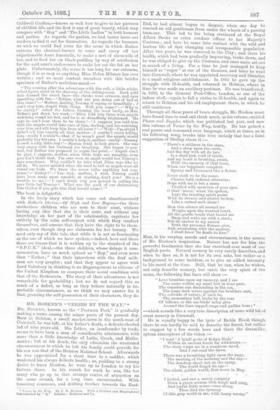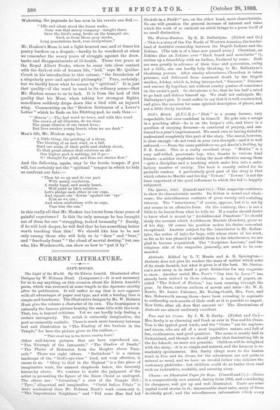MR. HOSKEN'S "VERSES BY THE WAY."* * Verses by the
Way. By J. D. Hoeken. with a Critical and Biographical Introduction by "Q." London : Methuen and Co. HOS3CEN, known as the "Postman Poet," is gradually making a name among the minor poets of the present day. Born at Helston, a small market-town in the south-west of Cornwall, he was left, at his father's death, a delicate-chested lad of nine years old. His father, an ironfounder by trade, seems to have been a man of considerable attainments, with more than a little knowledge of Latin, Greek, and Mathe- matics; but at his death, the only education the straitened circumstances in which he left his family could provide for his son was that of the Helston National School. Afterwards he was apprenticed for a short time to a saddler, which weakened his always delicate health ; so, yielding to a strong desire to leave Helston, ho went up to London to try his fortune there. In his search for work he was, like too many who go up to that strange centre of attraction on the . same errand, for a long time unsuccessful. With lessening resources, and drifting further towards the East- End, he had almost begun to despair, when one day he rescued an old gentleman from under the wheels of a passing tram-car. This led to his being stationed at the Royal Albert Docks as extra outdoor officer to her Majesty's Customs ; and here he came into contact with the wild and lawless life of that changing and irresponsible population. After two years, he was removed to the City ; and there his health, which had been gradually improving, broke down, and he was obliged to give up the Customs, and once more set out in search of a living. For a time he just managed to keep himself as " super " at one of the theatres, and later he went into Cornwall, where he was appointed secretary and librarian to a small religious establishment. In 1885 he gave up the struggle with ill-health, and returned to Helston, where in time he was made an auxiliary postman. He was transferred, in 1889, to the General Post-Office, London, as one of the indoor staff, —again to fall a victim to ill-health, and again to return to Heleton and his old employment there, in which he still continues.
Through all these years of brave struggle, Mr. Hosken must have found time to read and think much, as his volume, entitled Phaon and Sappho, which was published last year, and now this volume of Verses by the Way, testify. He has gained a real power and command over language, which at times, as in the following song, breaks into true melody that has a faint suggestion of Shelley about it :— "There's a stillness in the stars, And a sleep upon the earth,
And the day with all its jars Is a dead jest, void of mirth.
And my heart is breaking, sweet, With the memory of that hour, When our happiness complete Sprang and blossomed like a flower.
Never shall we be the same, Chance hath ordered otherwise; Hope with me is but a name Thrilled with inem'ries of your eyes. 0 that never,' when 'tis spoken, Lays the trusting spirit prone With its dreams and glories broken, Like a ruined arch alone!
How this silence all around me Weighs upon the wearied heart, All the gentle bonds that bound me Snap, and wake me with a start ; Not an answer to my sorrow Doth thy presence Nature give, And, awakening with the morrow, I shall know 'tie death to live."
Man, in his varying moods and circumstances, is the source of Mr. Hosken's inspiration. Nature has not for him the powerful fascination that she has exercised over most of our English poets. Natural scenery he very rarely describes, and when he does so, it is not for its own sake, but rather as a background to some incident, or to give an added intensity to his mood at the time. Still, that he can, when he wishes, not only describe scenery, but catch the very spirit of the scene, the following fine lines will show :— "Love breathes upon my memory, and I see
The scene within my mind lost in time past,
The ceaseless sun descending in the sea,
The huge dark waves against the boulders cast, The solitude of nature, if such bo, The momentary lull, broke by the roar
Of billows, or the sea-birds' noisy glee
Around the time-sapped crags and gullies hoar ; "
—which sounds like a very true description of some wild bit of coast scenery in Cornwall. He is equally happy in the lyric of Robin Hood, though there he can hardly be said to describe the forest, but rather to suggest by a few words here and there the dreamlike, sylvan atmosphere of his vision :— " I read A lytell geste of Robyn Bode' Within an ancient forest far withdrawn :— The story wrapt me in a wondrous mood,
And I out-read the dawn.
There was a trembling light upon the page, The meeting of the morning and the day— The dewdrop shook not on the spray,
The world forgot its age—
The silent, golden world, that morn in May.
I looked, and saw a merry company
Down a green avenue with laugh and song,
And joyful little noises come along, Then died the tyranny
Of this grey world in me, with hoary wrong."
Wakening, the pageants he has seen in his reverie are fled :—
"Idle and silent stood the forest walks,
Gone was that merry company—nought there Save the bird's song, broke on the tranquil air, Such as from those grey stocks, Long generations back, rose everywhere."
Mr. Hosken's Muse is not a light.hearted one, and at times his poetry borders on a despair,—hardly to be wondered at when we remember the weary years of struggle against the draw- backs and disappointments of ill-health. Those two years at the Royal Albert Docks, where he came into close contact with the darkest side of human life, "laid," says Mr. Quiller- Couch in his introduction to this volume, "the foundation of a singularly pure and spiritual philosophy." Pure, certainly; but we hardly know what he means by "spiritual." It is just that quality—if the word be used in its ordinary sense—that Mr. Hosken seems to us to lack. It is from the lack of this quality that his Muse, when taking her strongest flights, sometimes suddenly drops down like a bird with an injured wing. Commenting on the "Broken Sentences of a Lover's Letter" which he finds on his Blotting-pad, he ends thus :—
"‘ Heaven' ; —The last word we trace, and with this word
The crown of all illusions, do we close The great illusion of our insect lives ; But love awakes young hearts when we are dust."
Man's life, Mr. Hosken says, is,— " A little thing, the pricking of a thorn, The blowing of an east wind, or a fall, Send our souls, of their pride and station shorn, To that great silence that receives us all : Our higher part is nothing, let it go- 0 ! thought for grief, and thus our stories flow," And the following, again, may be the heroic temper, if you will, but certainly not the " spiritual " temper in which he bids us confront our fate :—
"Then let us up and do our part
With manly resolution, A ready hand, and manly heart, Will yield us life's solution. Let's pledge each other in our cups. And square our 'downs' against our 'ups' E'en as we can ; And when misfortune with us sups, Pass him the can."
Is this really all that Mr. Hosken has learnt from those years of painful experience P Is this the only message he has brought out of them for our "struggling, tasked humanity" P Surely, if be will look deeper, he will find that he has something better worth teaching than this ! We should like him to be not only among those who will help us to " dare " and "bear," and "fearlessly front" "the cloud of mortal destiny," but one who, like Wordsworth, can show us how to "put it by."







































 Previous page
Previous page